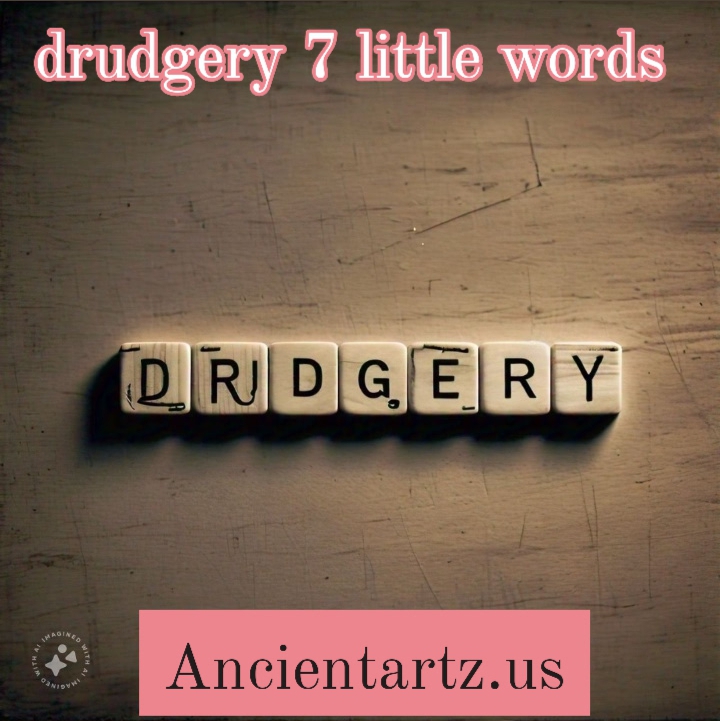Introduction
In the world of puzzles and games, one particular challenge has captured the attention of avid word enthusiasts – 7 Little Words. It’s a captivating yet, at times, grueling experience that both entertains and frustrates. While it may seem like a simple game, 7 Little Words can often feel like a chore, especially when the clues don’t make sense, or when the answers seem to elude you despite your best efforts. This paradox of fun and frustration creates a unique experience for its players, making them navigate through puzzles that require both strategy and patience. In this article, we will explore the drudgery that often accompanies 7 Little Words, offering insights, strategies, and solutions to make the game more enjoyable and less of a mental burden.
Understanding the Concept of “7 Little Words”
Before diving into the complexities of the game, it’s important to understand what 7 Little Words is all about. The game is essentially a word puzzle where players are given seven clues, each of which corresponds to a word made up of seven letters. The goal is to solve all seven clues, which, in turn, lead to the complete puzzle solution. While the premise is straightforward, the execution can be tricky, especially as the clues range from simple to complex.
The Drudgery of 7 Little Words
The fun in 7 Little Words often transforms into frustration when players hit a roadblock. The clues, which can sometimes feel abstract or convoluted, may leave players stuck, searching for a word that fits both the clue and the number of available spaces. Here are a few reasons why 7 Little Words can become a challenging experience for many:
- Ambiguous Clues: One of the main challenges is the ambiguity of the clues. While some are straightforward, others may require a deep understanding of synonyms, word meanings, or wordplay. When players encounter these tricky clues, the frustration can build up quickly, especially if they’re unfamiliar with the word being hinted at.
- Limited Letters: Each puzzle provides a set of letter tiles that must be used to form words. Sometimes, players find that the tiles available don’t immediately suggest the answer. The drudgery of 7 Little Words is magnified when you have too many options or when the letters don’t seem to fit the clues at all.
- Time Pressure: While the game doesn’t have a strict timer, there’s often a sense of urgency that comes with completing the puzzle, particularly when players feel they are close to solving it but can’t quite figure out a final word. This psychological pressure can add to the difficulty and make the experience more stressful.
- Repetitive Gameplay: Another aspect of the game that can lead to drudgery is the repetition. After playing multiple puzzles, players may encounter similar patterns or recurring words. This can make the experience feel monotonous, even though each puzzle presents a unique challenge.
Why Do We Keep Playing Despite the Frustration?
Despite the challenges, there’s something undeniably addictive about 7 Little Words. Understanding why people keep coming back for more, even when the game feels like a mental workout, can provide insight into its appeal. Here are a few reasons why players continue to engage with the game:
- Sense of Achievement: There’s a sense of accomplishment that comes from completing a challenging puzzle. Solving the final word after hours of thought or after multiple attempts provides a great feeling of satisfaction, making the experience worthwhile despite the frustrations along the way.
- Mental Stimulation: 7 Little Words offers a great workout for the brain. It helps enhance vocabulary, improve cognitive abilities, and boost problem-solving skills. For many players, the challenge is worth the mental stimulation it provides.
- Escapism: Much like any other game, 7 Little Words offers an escape from the daily grind. While it can be difficult, it also provides a brief mental break, allowing players to immerse themselves in something fun and challenging.
Tips and Tricks for Tackling 7 Little Words
Now that we’ve acknowledged the challenges of 7 Little Words, let’s explore some tips and tricks that can help ease the drudgery and make the game more enjoyable.
1. Start with the Easy Clues
Begin by solving the easier clues first. This will give you a few letters to work with, making it easier to tackle the more difficult clues. Once you have a few answers, you’ll have a better idea of what letter combinations are possible, and the rest of the puzzle will seem more manageable.
2. Use Word Patterns
When you’re stuck, try to think of common word patterns. For instance, many seven-letter words end in “-ing” or “-ness.” If you can identify a pattern that fits, you might be able to narrow down your options and solve the puzzle faster.
3. Don’t Hesitate to Use the Hints
Hints are there for a reason. Don’t be afraid to use them, especially if you find yourself in a mental block. The game offers several hints that can provide just the nudge you need to get back on track.
4. Work on One Word at a Time
Focus on solving one word at a time. Trying to solve multiple clues at once can overwhelm you. Instead, take a step-by-step approach and focus on solving the words individually.
5. Take Breaks
If you find yourself getting too frustrated, take a break and come back to the puzzle later. Sometimes, a fresh perspective can help you spot the answer more easily.
Conclusion
While 7 Little Words may start off as a fun and casual game, its inherent challenges can quickly turn it into a mentally taxing experience. The combination of ambiguous clues, limited letter options, and time pressure can make the game feel like a drudgery at times. However, it is precisely these challenges that make the game addictive, providing a sense of accomplishment and mental stimulation that keeps players coming back for more.
By adopting a few strategies, such as starting with the easy clues and taking breaks when needed, players can navigate the drudgery of 7 Little Words and turn it into a more enjoyable and rewarding experience. So, the next time you find yourself stuck on a particularly tough puzzle, take a deep breath and remember: every challenge is an opportunity to learn and grow.
FAQs
1. How many puzzles are there in 7 Little Words? 7 Little Words offers an extensive range of puzzles, with hundreds of daily puzzles to keep players engaged. The game also features various puzzle packs that cater to different interests and difficulty levels.
2. Can I play 7 Little Words offline? Yes, 7 Little Words can be played offline. Once you’ve downloaded the puzzles, you can solve them at your own pace without needing an active internet connection.
3. How can I get better at 7 Little Words? To get better at 7 Little Words, practice is key. Start by solving easier puzzles and gradually work your way up to more difficult ones. Also, familiarize yourself with common word patterns and utilize hints when necessary.
4. Are there any cheat codes for 7 Little Words? While there are no cheat codes, the game provides hints and letter tiles that can help you solve difficult puzzles. Some players may also refer to online forums or puzzle-solving websites for assistance.
5. Is 7 Little Words suitable for all ages? Yes, 7 Little Words is suitable for players of all ages. It’s an educational game that helps improve vocabulary and cognitive abilities, making it a great choice for both kids and adults alike.


